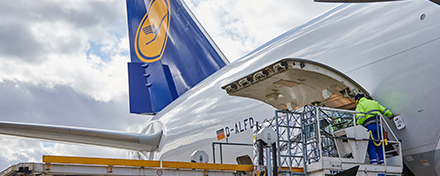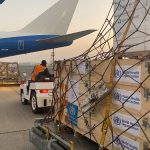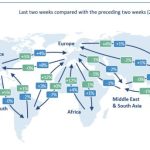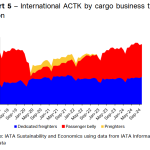Lufthansa Cargo Rebounds with renewed strength
Lufthansa Group, its parent company, also made significant profits in 2017 with total revenues amounting to EUR 35.6 billion, up 12.4 percent over 2016, which it described as its best results so far in its history with the inclusion of the positive EUR 582 million one-off effect from agreeing on the collective labor agreement with the Vereinigung Cockpit union for the pilots of Lufthansa, Lufthansa Cargo and Germanwings.
Peter Gerber, CEO and Chairman of the Executive Board of Lufthansa Cargo AG, marked out 2017 as “one of the most successful years in the history of Lufthansa Cargo.”
Gerber attributed Lufthansa Cargo’s excellent performance to “a strong focus on cost optimization, high-performance products and flexible capacity management” and the company’s strong sales team.
“2017 developed into one of the most successful years in the history of Lufthansa Cargo,” Gerber said during their annual press event in March held at the Lufthansa Aviation Center in Frankfurt, Germany.
“Lufthansa Cargo has achieved impressive earnings. In the volatile logistics business, our team demonstrated high profess-ionalism and passionate commitment. For the current year, we will therefore remain focused on pursuing our efficiency program and investing in our future. At present, these are mainly investments in ground infrastructure for highly profitable special business and in digitization,” continued Gerber, a lawyer who has been with Lufthansa since 1992, rising from the ranks to become one of its longest serving CEOs.
 Dr. Martin Schmitt, Lufthansa Cargo Chief Financial Officer and Human Resources Officer, Personnel Director, said the company’s higher revenues were also a result of certain cost-cutting measures, including in personnel, and prudent restructuring plans.
Dr. Martin Schmitt, Lufthansa Cargo Chief Financial Officer and Human Resources Officer, Personnel Director, said the company’s higher revenues were also a result of certain cost-cutting measures, including in personnel, and prudent restructuring plans.
“I’m happy to be here. Much happier than last year,” Schmitt said in jest during the press conference.
Total operating income of Lufthansa Cargo increased by 21.2 percent to a total of EUR 2.6 billion in 2017. Adjusted EBIT improved by EUR 292 million to EUR 242 million over the difficult previous year. EBIT improved by EUR 304 million to EUR 240 million.
Lufthansa Cargo has reduced the size of its MD-11F fleet to 12 aircraft by selling two aircraft. A MD-11F was reactivated in November 2017 because of the sharp rise in demand in time for the industry’s usual peak season at the end of the year, so that Lufthansa Cargo operated a total of 17 cargo aircraft including five B777F freighters at the end of 2017. In addition, there is the capacity of approximately two 777 from the Aerologic joint venture.
Air freight: A growth market
 Gerber, the CEO of Europe’s leading cargo airline, underscored air freight will remain a growth market in the coming years but it will still be characterized with volatility, with both external and internal factors influencing its movement.
Gerber, the CEO of Europe’s leading cargo airline, underscored air freight will remain a growth market in the coming years but it will still be characterized with volatility, with both external and internal factors influencing its movement.
“This business seems to be very volatile,” said Gerber who was visibly happy that the company performed well despite stiff global competition regaining its top spot as the best cargo carrier in the world followed by Emirates, Cathay Pacific, Air France and Korean Air rounding up the top 5 list. “It’s nice to be on top. But the question is what’s in the upcoming years. It’s very difficult to predict.”
But while that may be the case, Gerber is convinced air freight will continue to grow along with e-Commerce which requires speed and efficiency in delivery.
“Air freight is and will remain a growth market. For certain goods, air freight is the only choice. Above all, export-strong regions such as Germany are an excellent long-term basis for the air freight business,” he said.
China is of particular interest to many cargo carriers like Lufthansa because of its huge domestic market—1.4 billion—much bigger than the entire Europe’s population of over 741 million.
Gerber said it’s important to recognize China’s potential for market growth with its rising middle class, estimated at more than 400 million, way more than Europe’s purchasing adult population.
“They buy on the net. And they want goods to be delivered on the same day. Not three or four months later,” said Gerber who also attended Columbia Business School in New York.
Technology & Digitalization
Gerber is convinced it’s time for the air freight industry to embrace technology and digitalization in the supply chain to keep up with the time, enhance efficiency and reduce operating costs.
Lufthansa Cargo itself is slowly embracing digitalization with plans to fully digitalize its transactions with all of the players in the transport chain, from bookings to deliveries, believing that customers will benefit from greater transparency, higher speeds, better quality and more flexibility as well as greater efficiency.
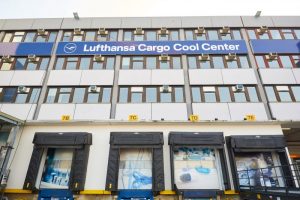
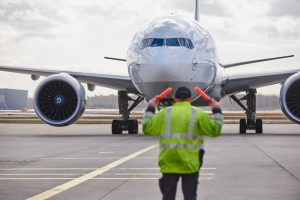
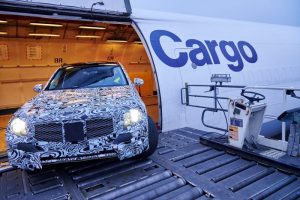 In 2017, Lufthansa Cargo modernized its revenue management to enable greater differentiation. The response times in sales were further improved by a significant reduction in the number of manual processes.
In 2017, Lufthansa Cargo modernized its revenue management to enable greater differentiation. The response times in sales were further improved by a significant reduction in the number of manual processes.
Lufthansa Cargo is also working closely with start-ups as part of its strategic Cargo Evolution program, in order to make its business more customer-friendly along the entire transport chain. The freight center in Frankfurt is being continually modernized.
“Progress in technology is acce-lerating fast. When everything is accelerating, there is growth. I think it’s fair to predict there will be substantial growth in our industry,” said Gerber beaming with hope in an industry that accounts for about a third of the world’s total trade.







